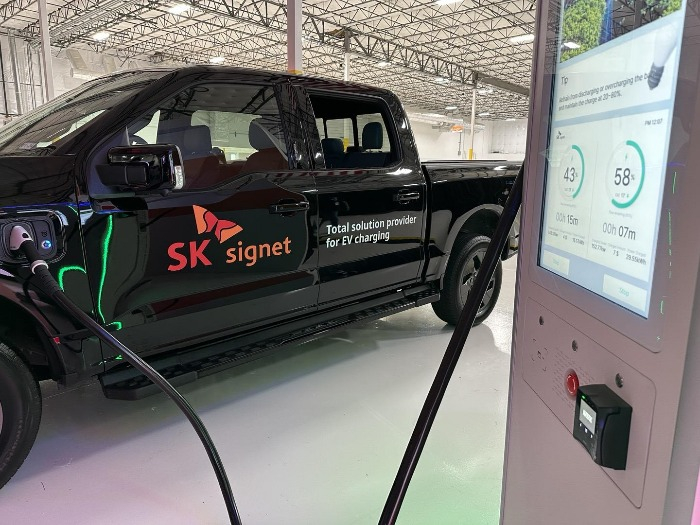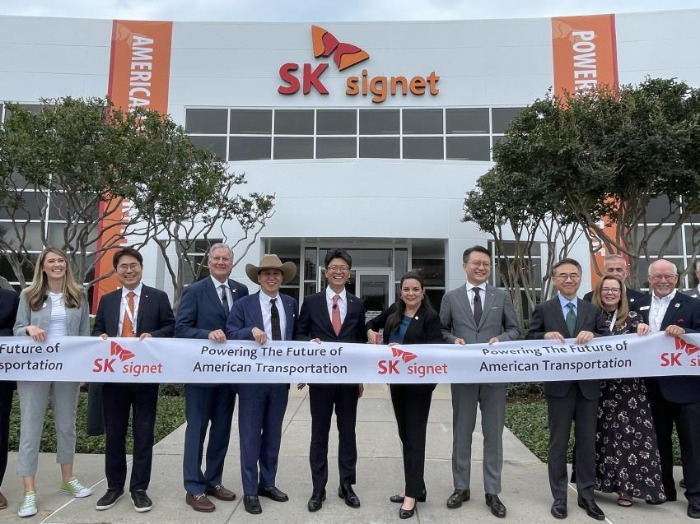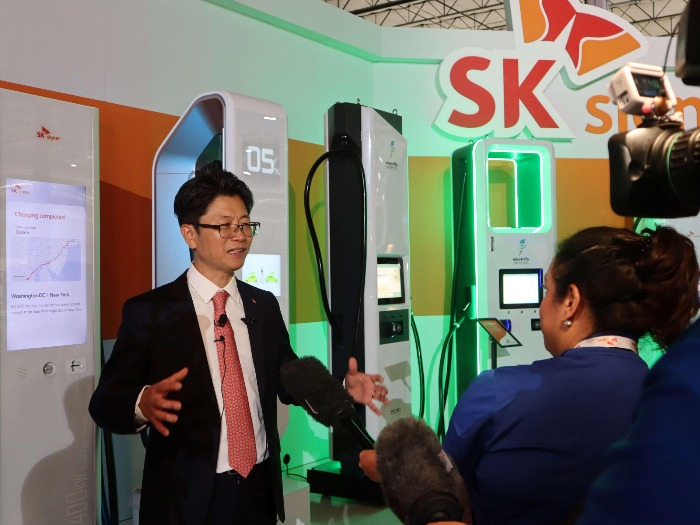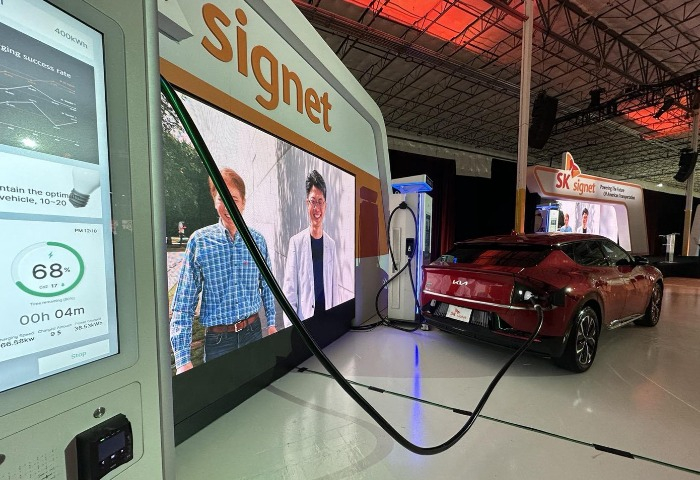Electric vehicles
SK set to produce faster EV chargers than Tesla in US
The company aims to command 30% of the global EV charger market by 2025
By Jun 06, 2023 (Gmt+09:00)
4
Min read
Most Read
LG Chem to sell water filter business to Glenwood PE for $692 million


Kyobo Life poised to buy Japan’s SBI Group-owned savings bank


KT&G eyes overseas M&A after rejecting activist fund's offer


StockX in merger talks with Naver’s online reseller Kream


Mirae Asset to be named Korea Post’s core real estate fund operator



DALLAS, TEXAS - South Korea’s SK Signet Inc. is poised to produce electric vehicle chargers with the fastest charging speed in the US, targeting the ultra-fast charger market dominated by Tesla Inc.
The SK Group unit on Monday completed construction on its state-of-the-art manufacturing plant for EV battery chargers in Texas, which marked the first EV charger facility built in the US by a South Korean company.
At the ceremony for completion, its Chief Executive Shin Jung-ho expressed confidence about SK's competitivity against Tesla in terms of charging speed and compatibility with a broader range of EVs.
“Tesla Superchargers are dedicated to Tesla EVs, so they might be less compatible with other EVs,” he said.
The plant in Plano, 20 miles northeast of Dallas, will churn out 10,000 units of 400 kilowatt hour (kWh) EV chargers per year, starting next month.
Currently, Tesla EVs and Hyundai Motor Co.'s all-electric IONIQ 5 are powered by batteries with a capacity of 230 kWh, meaning they can be charged at 230 kW per hour.
Namely, a 400 kWh charger will refuel the IONIQ 5 to 80% in 15 minutes, enabling a 400 km drive at a single charge from Seoul to Busan, South Korea’s second-largest city.
By comparison, General Motor Co.'s Hummer EV and the Porsche Taycan EV each have a charging capacity of 360 kWh.
Given that, SK Signet’s 400 kWh chargers will be capable of powering new EVs with a larger battery capacity, according to the company.

The EV market grew to 4.6% of automobiles sold in the US in 2021, compared to 0.2% in 2011, according to US government statistics.
S&P Global, a data service provider, forecast that EVs will likely account for 40% for new vehicles in the global automobile market by 2030.
Tesla and other EV charging point operators (CPOs) such as Electrify America (EA) and EVgo are bolstering their EV charging networks, supported by US government subsidies.
Under the US Inflation Reduction Act, the Biden administration pledged to spend a total of $7.5 billion to expand the country’s EV charging networks, or an infrastructure system of charging stations, over the next five years.
The US government plans to place an EV charging station at every 50 miles of highway, for which state governments of the US will offer subsidies to EV chargers.
To qualify for the subsidies, one of the key requirements is that CPOs, or public EV fast-charging networks, must build a facility with 600 kWh chargers in total, or more.
That will be enough to charge more than four EVs with a 150 kW battery capacity simultaneously.

“The huge charger subsidy market has just opened and our products will be eligible for US government subsidies,” said CEO Shin.
“We will be able to announce several supply deals with CPOs sooner rather than later.”
In 2021, SK Group acquired Signet for 293.2 billion won ($ 220 million), which entered the charger market in 2016 and has won a string of orders from CPOs such as Electrify America (EA) and EVgo.
SK Signet chargers now account for 75% of ultra-fast chargers installed at EA stations in the US, a sharp increase from 25% a few years earlier.
The global EV charger market reached $3.4 billion in 2022, growing at an annual average rate of 30%.
By 2025, the market is forecast to double to $7 billion. The superfast charger market, or 200 kW chargers, is projected at $3.2 billion by 2025, shy of the $3.8 billion for slower and fast chargers, or those of 200 kWh or below.
Particularly, SK Signet will zoom in on the ultra-fast charger market, the highest margin segment, and aims to achieve 1 trillion won in revenue in 2025, about sixfold growth compared to 160 billion won in 2022.
“We will command 30% of the world’s (EV charger market) by 2025,” Shin said.

Still, Tesla Inc. is the biggest obstacle to achieving its goal.
It operates some 1,800 Tesla Supercharger stations across the US, where 17,000 units of its chargers are installed. That compares to 2,300 units of SK Signet's chargers available at EV charging stations in the country.
Tesla is now opening its charging stations to other EV brands and has increased its charging speed to 250 kWh from 150 kWh.
To better compete with the EV leader, SK Signet is developing a bigger-capacity charger of 1 megawatt hour, or 1,000 kWh. It is also diversifying into the hardware and software of chargers, as well as maintenance and repair services.
Write to Hyun-Suk Kim at realist@hankyung.com
Yeonhee Kim edited this article.
More to Read
-

-
 Bio & PharmaSK Signet lands first order in UK worth $7.7 million
Bio & PharmaSK Signet lands first order in UK worth $7.7 millionFeb 21, 2023 (Gmt+09:00)
1 Min read -
 Electric vehiclesSK Signet to showcase new ultra-fast charger at CES 2023
Electric vehiclesSK Signet to showcase new ultra-fast charger at CES 2023Dec 22, 2022 (Gmt+09:00)
1 Min read -
 Electric vehiclesSK Signet to build $15 million EV charger plant in Texas
Electric vehiclesSK Signet to build $15 million EV charger plant in TexasOct 12, 2022 (Gmt+09:00)
1 Min read
Comment 0
LOG IN


